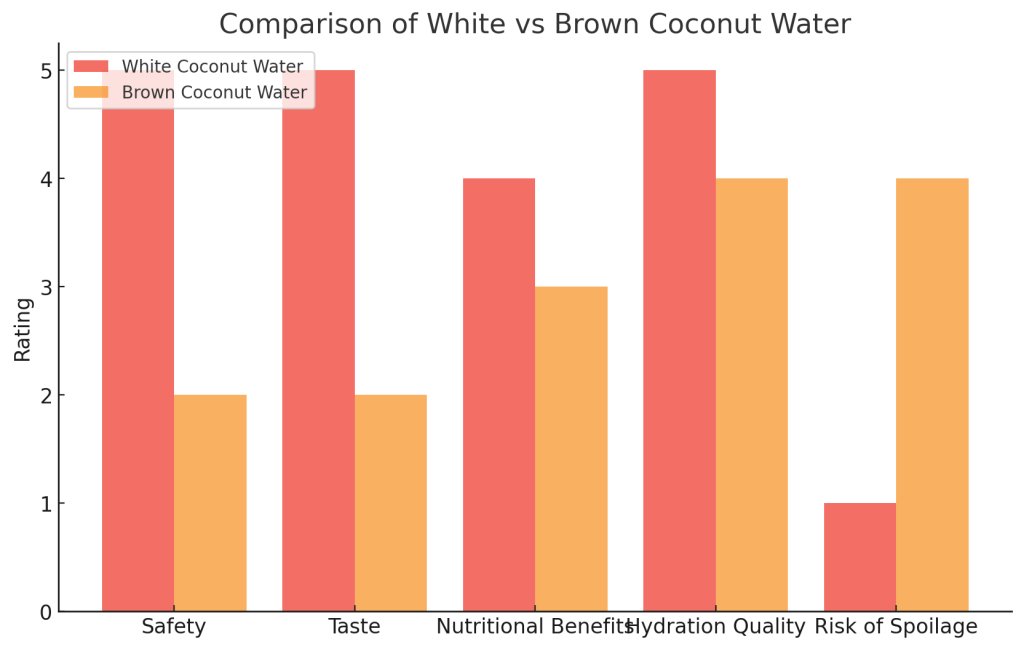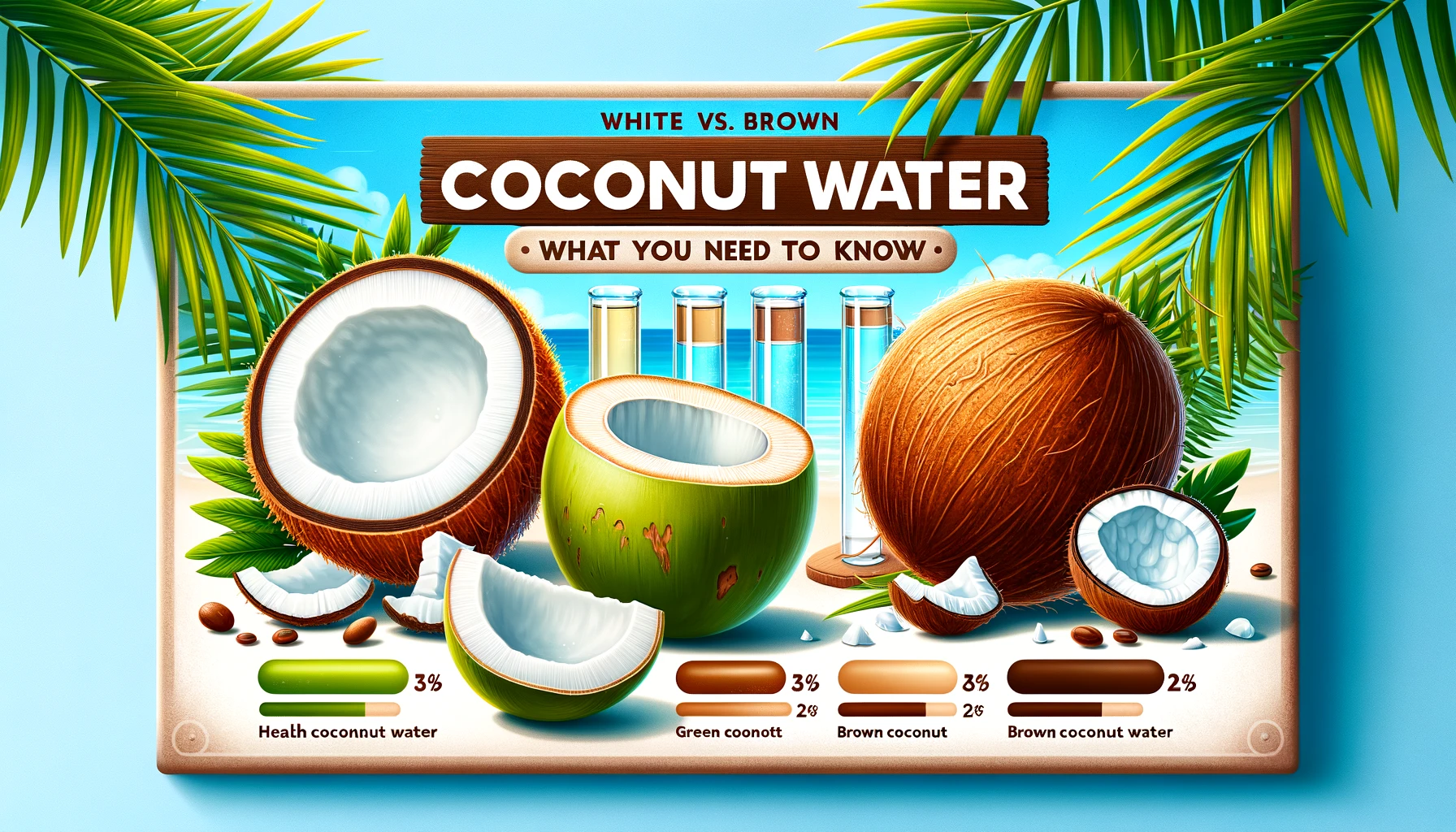Key Takeaways Table
| Aspect | Detail |
|---|---|
| Safety | Brown coconut water can be safe but is prone to spoilage |
| Taste Difference | Less sweet and lacks freshness compared to white coconut water |
| Health Risks | Potential for bacterial contamination and digestive issues |
| Indicators of Spoilage | Vinegary or sour scent, sour taste, carbonation |
| Best Choice | Prefer white coconut water from young coconuts for safety and taste |
Understanding Brown Coconut Water
Coconut water, a favorite refreshing drink for many, is usually clear or slightly white. However, it can turn brown due to oxidation and exposure to air, and this change raises questions about its safety and quality.
Is Brown Coconut Water Safe?
Brown coconut water is often considered safe to drink if it doesn’t exhibit signs of spoilage, such as a sour scent, sour taste, or carbonation. However, the brown color indicates that it is older and has lost its freshness and sweetness. Supermarkets often advise against drinking brown coconut water due to its increased risk of going bad and potentially causing digestive issues.
Health Implications
Drinking brown coconut water can be a gamble. It may cause digestive discomfort, especially for those with sensitive stomachs. Brown coconut water contains enzymes like polyphenol oxidase and peroxidase, which cause the water to brown as part of an oxidation process. While not inherently harmful, this process can lead to fermentation, making the coconut water less palatable and potentially hazardous.
What Happens If You Drink It?
Consuming brown coconut water can expose you to bacteria such as E.coli, leading to stomach inflammation, discomfort, diarrhea, nausea, vomiting, and dehydration. In more severe cases, it could cause respiratory illness, pneumonia, and urinary tract infections.
Comparing White and Brown Coconut Water
White coconut water, typically found in younger green coconuts, is preferred for its safety and taste. It is fresher, sweeter, and less prone to spoilage. On the other hand, brown coconut water, while possibly safe, has lost much of its appeal due to reduced sweetness and freshness. Brown coconuts are more mature, and their water is less suitable for drinking. However, they are often used for their meat and in producing coconut milk and oil.

Nutritional Profile and Benefits of Coconut Water
Coconut water is celebrated for its hydrating qualities and rich nutritional profile. It contains vital electrolytes and is an excellent source of hydration after physical activity or exposure to heat. Coconut water can also benefit heart health, lower blood sugar, and improve kidney function. However, it’s important to consume it in moderation due to its sugar and calorie content, which can affect blood sugar levels and dietary balance if consumed excessively.
Avoiding Health Risks with Brown Coconut Water
To mitigate the health risks associated with brown coconut water, it’s crucial to recognize signs of spoilage. If the coconut water has a deep vinegary or sour scent, a sour taste, or shows signs of carbonation, it’s best to discard it to avoid potential health risks like stomach upset.
For Further Reading
Practical Tips for Coconut Water Consumers
When selecting coconut water, whether in stores or fresh from the coconut, here are some practical tips to ensure you’re making a healthy choice:
- Check the Color: Opt for clear or slightly white coconut water. Avoid brown coconut water as it indicates age and potential spoilage.
- Smell and Taste: Fresh coconut water should have a mildly sweet and nutty aroma. Any sour or vinegary smell is a red flag.
- Storage and Handling: Store unopened coconut water in a cool, dry place. Once opened, refrigerate and consume within a short period to avoid spoilage.
Integrating Coconut Water into Your Diet
Coconut water can be a nutritious addition to your diet, but like any food or drink, it should be consumed in moderation. Its natural sugars and calories can add up, especially if you’re watching your sugar intake or trying to maintain a balanced diet. Here’s how to integrate coconut water healthily:
- As a Hydration Source: Use coconut water as a refreshing drink post-workout or during hot weather.
- In Smoothies: Add coconut water to smoothies for natural sweetness and hydration.
- Moderation is Key: Balance your consumption of coconut water with other hydrating liquids like water to maintain a healthy diet.
Final Thoughts and Call to Action
Coconut water offers a range of benefits, but it’s essential to choose the right type for safety and enjoyment. Remember to prefer clear coconut water from young, green coconuts and avoid brown coconut water, which may have undergone spoilage or fermentation. By following these guidelines, you can enjoy the health benefits of coconut water without the risks associated with its brown counterpart.

